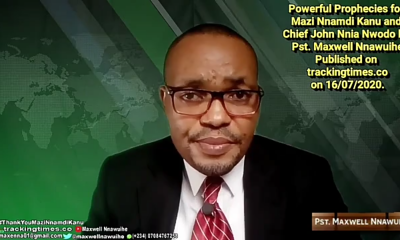INSPIRATION
SCRIPTURE FOR TODAY WEDNESDAY 8 NOV. 2017
Proverbs 14:1-35
1
KJV: Every wise woman buildeth her house: but the foolish plucketh it down with her hands.
BBE: Wisdom is building her house, but the foolish woman is pulling it down with her hands.
2
KJV: He that walketh in his uprightness feareth the LORD: but he that is perverse in his ways despiseth him.
BBE: He who goes on his way in righteousness has before him the fear of the Lord; but he whose ways are twisted gives him no honour.
3
KJV: In the mouth of the foolish is a rod of pride: but the lips of the wise shall preserve them.
BBE: In the mouth of the foolish man is a rod for his back, but the lips of the wise will keep them safe.
4
KJV: Where no oxen are, the crib is clean: but much increase is by the strength of the ox.
BBE: Where there are no oxen, their food-place is clean; but much increase comes through the strength of the ox.
5
KJV: A faithful witness will not lie: but a false witness will utter lies.
BBE: A true witness does not say what is false, but a false witness is breathing out deceit.
6
KJV: A scorner seeketh wisdom, and findeth it not: but knowledge is easy unto him that understandeth.
BBE: The hater of authority, searching for wisdom, does not get it; but knowledge comes readily to the open-minded man.
7
KJV: Go from the presence of a foolish man, when thou perceivest not in him the lips of knowledge.
BBE: Go away from the foolish man, for you will not see the lips of knowledge.
8
KJV: The wisdom of the prudent is to understand his way: but the folly of fools is deceit.
BBE: The wisdom of the man of good sense makes his way clear; but the unwise behaviour of the foolish is deceit.
9
KJV: Fools make a mock at sin: but among the righteous there is favour.
BBE: In the tents of those hating authority there is error, but in the house of the upright man there is grace.
10
KJV: The heart knoweth his own bitterness; and a stranger doth not intermeddle with his joy.
BBE: No one has knowledge of a man’s grief but himself; and a strange person has no part in his joy.
11
KJV: The house of the wicked shall be overthrown: but the tabernacle of the upright shall flourish.
BBE: The house of the sinner will be overturned, but the tent of the upright man will do well.
12
KJV: There is a way which seemeth right unto a man, but the end thereof are the ways of death.
BBE: There is a way which seems straight before a man, but its end is the ways of death.
13
KJV: Even in laughter the heart is sorrowful; and the end of that mirth is heaviness.
BBE: Even while laughing the heart may be sad; and after joy comes sorrow.
14
KJV: The backslider in heart shall be filled with his own ways: and a good man shall be satisfied from himself.
BBE: He whose heart is turned away will have the reward of his ways in full measure; but a good man will have the reward of his doings.
15
KJV: The simple believeth every word: but the prudent man looketh well to his going.
BBE: The simple man has faith in every word, but the man of good sense gives thought to his footsteps.
16
KJV: A wise man feareth, and departeth from evil: but the fool rageth, and is confident.
BBE: The wise man, fearing, keeps himself from evil; but the foolish man goes on in his pride, with no thought of danger.
17
KJV: He that is soon angry dealeth foolishly: and a man of wicked devices is hated.
BBE: He who is quickly angry will do what is foolish, but the man of good sense will have quiet.
18
KJV: The simple inherit folly: but the prudent are crowned with knowledge.
BBE: Foolish behaviour is the heritage of the simple, but men of good sense are crowned with knowledge.
19
KJV: The evil bow before the good; and the wicked at the gates of the righteous.
BBE: The knees of the evil are bent before the good; and sinners go down in the dust at the doors of the upright.
20
KJV: The poor is hated even of his own neighbour: but the rich hath many friends.
BBE: The poor man is hated even by his neighbour, but the man of wealth has numbers of friends.
21
KJV: He that despiseth his neighbour sinneth: but he that hath mercy on the poor, happy is he.
BBE: He who has no respect for his neighbour is a sinner, but he who has pity for the poor is happy.
22
KJV: Do they not err that devise evil? but mercy and truth shall be to them that devise good.
BBE: Will not the designers of evil come into error? But mercy and good faith are for the designers of good.
23
KJV: In all labour there is profit: but the talk of the lips tendeth only to penury.
BBE: In all hard work there is profit, but talk only makes a man poor.
24
KJV: The crown of the wise is their riches: but the foolishness of fools is folly.
BBE: Their wisdom is a crown to the wise, but their foolish behaviour is round the head of the unwise.
25
KJV: A true witness delivereth souls: but a deceitful witness speaketh lies.
BBE: A true witness is the saviour of lives; but he who says false things is a cause of deceit.
26
KJV: In the fear of the LORD is strong confidence: and his children shall have a place of refuge.
BBE: For him in whose heart is the fear of the Lord there is strong hope: and his children will have a safe place.
27
KJV: The fear of the LORD is a fountain of life, to depart from the snares of death.
BBE: The fear of the Lord is a fountain of life, by which one may be turned from the nets of death.
28
KJV: In the multitude of people is the king’s honour: but in the want of people is the destruction of the prince.
BBE: A king’s glory is in the number of his people: and for need of people a ruler may come to destruction.
29
KJV: He that is slow to wrath is of great understanding: but he that is hasty of spirit exalteth folly.
BBE: He who is slow to be angry has great good sense; but he whose spirit is over-quick gives support to what is foolish.
30
KJV: A sound heart is the life of the flesh: but envy the rottenness of the bones.
BBE: A quiet mind is the life of the body, but envy is a disease in the bones.
31
KJV: He that oppresseth the poor reproacheth his Maker: but he that honoureth him hath mercy on the poor.
BBE: He who is hard on the poor puts shame on his Maker; but he who has mercy on those who are in need gives him honour.
32
KJV: The wicked is driven away in his wickedness: but the righteous hath hope in his death.
BBE: The sinner is overturned in his evil-doing, but the upright man has hope in his righteousness.
33
KJV: Wisdom resteth in the heart of him that hath understanding: but that which is in the midst of fools is made known.
BBE: Wisdom has her resting-place in the mind of the wise, but she is not seen among the foolish.
34
KJV: Righteousness exalteth a nation: but sin is a reproach to any people.
BBE: By righteousness a nation is lifted up, but sin is a cause of shame to the peoples.
35
KJV: The king’s favour is toward a wise servant: but his wrath is against him that causeth shame.
BBE: The king has pleasure in a servant who does wisely, but his wrath is against him who is a cause of shame.
STAY BLESSED AND STAY WISE. AMEN.
Business
Managing, Leading, Building Institutions And Sustainability
The two primary tasks of a top-level leader are to exploit and explore the organisation with people for now and in the future.
By Babs Olugbemi
One of my concerns for leaders is their capacity to be ambidextrous. Regardless of years of experience, knowledge, and leadership capacity, the lack of a clear distinction between managing and leading on the one hand, leading and building institutions on the second layer, and ultimately focussing on sustainability is a significant threat to successful leadership change.
I have followed events and people at C-suites, coached some, and developed frameworks for leadership development. Based on the personalities and styles of the new leaders, I have confirmed my fears about leadership sustainability in most African organisations.
“Successful leaders can aptly differentiate themselves and their roles without necessarily seeing activities as performance, focussing on what is required of them with appropriate tenacity and influence.”
The challenge for leaders is how to lead for the present and future without losing sight of the stakeholders’ immediate performance expectations. Successful leaders can aptly differentiate themselves and their roles without necessarily seeing activities as performance, focussing on what is required of them with appropriate tenacity and influence.
READ ALSO: Leadership, not God responsible for Africa’s poverty
Afrocentric colonialism: The new face of African oppression
Health: Genotype And Compatibility, Phenotype, Blood Groups And DNA
In my walk as a leadership coach, I have keenly observed leaders who are managing rather than leading. Managing involves ensuring that processes achieve their intended outcomes. Leaders are above managing and should focus on creating an enabling environment for innovation, inventions, and team collaboration. The primary role in leading is not to monitor process outcomes, though critical to the company’s overall objectives, but to align corporate values with the people’s aspirations to create an engaged and ownership-thinking mindset ready to take on challenges and explore opportunities. An alignment of corporate and personal goals will not only deliver the present performance expectations. Still, it will also incubate innovations to adapt to future market demands and the sustainability of the business.
Unfortunately, the capacity for ambidexterity is rare and often marked by leaders’ exposure, approach and styles, perception, and perspective of their roles in the organisation. A leader with a wrong foundation in these areas is set for failure and awaits unfavourable decisions from the board of directors. A top-level leader might manage their teams instead of leading them. Not all leaders can combine leading for the present with building institutions. However, anyone able to submit themselves to an institution-building mechanism can champion sustainability. Aside from being a leadership coach, I help leaders achieve sustainability.
Mathematically, creating an ambidextrous organisation is beyond leading. It is to lead and build an institution that focuses on sustainability in all aspects of the organisation—employee fulfilment, customer retention, strategy effectiveness, performance evaluation, stakeholder management, process improvement, and goal congruence.
In a nutshell, the role of successful leaders in ambidextrous organisations is striking a balance between exploiting current assets and capabilities to ensure short-term success and allocating enough energy and resources to exploration to ensure future viability. The two primary tasks of a top-level leader are to exploit and explore the organisation with people for now and in the future. The two seemingly contradictory aspects—exploitation and exploration—encompass different strategies and processes and have different targets and outcomes (March 1991; O’Reilly & Tushman, 2004; O’Reilly & Tushman, 2013).
O’Reilly and Tushman described the two concepts as follows:
- Exploiting: Exploiting involves building on an organisation’s achievements and maximising returns on previous investments. It focuses on responding to current business demands to remain efficient and competitive within an established market niche, as well as on maintaining an existing customer base and stakeholder relationships. Examples of exploiting are activities focused on continuous improvement, benchmarking, and redesigning business processes.
- Exploring: Exploring focuses on expanding an organisation’s knowledge and capabilities, pioneering new products and services, and discovering and venturing into untapped markets.
The common area of practical bottlenecks in exploiting and exploring in organisations is a need for foundational trust and cohesion among the resources, especially the human capital, which are often treated as costs rather than assets to the organisations. Among all the factors of production, only humans can be ambidextrous with the capacity to think about changes in economic parameters and adjust their behaviours to match the time, content, and contextual requirements.
While organisations might have the resources to deploy in fighting competition, technology to obtain first-mover advantages, and production capacity to maximise output from input, none is compared with the potential of an engaged workforce.
Therefore, for leaders to be successful, they must refrain from operating in the realm of managing. They should operate in the capacity of institution builders, with the mindset of creating sustainable leadership and growth with people first and other factors of production second.
Consequently, only the leaders who prioritise their people over profits, pride, and organisational arrogance will be successful in the long term.
Business
BUSINESS: 3 Non-Financial Factors That Could Impact Your Business’ Value-JESSICA FIALKOVICH
we also look at factors like the level of owner involvement, company goals and growth opportunities.
Jessica Fialkovich, an entrepreneur leadership network contributor, has listed three important non-financial factors that could impact business value.
In a business publication on Entrepreneur, Fialkovich revealed that, to come up with the true value of a company or business, “we also look at factors like the level of owner involvement, company goals and growth opportunities.”
She explained that, “Determining a business’ value is not all about adding up revenue and subtracting expenses. While an important piece, these hard numbers are only half the equation for computing what a company is worth. To come up with the true value, we also look at factors like the level of owner involvement, company goals and growth opportunities. When we use the complete equation, we get a comprehensive picture of a business and can better understand the story of its past, present and future.”
“Calculations may vary depending on the company, but in a healthy one, there is about a 50/50 split between the quantitative (financial) and qualitative (non-financial) sides of performance. If the business isn’t profitable, it’s more important to focus on the quantitative side and fix the numbers first. Many owners don’t want to hear that, but if they’re not hitting their numbers, it may mean the business is not working. They must fix the quantitative issues before moving to the qualitative side” she added.
The first factor is what is called:
The owner’s Goal
We’ve found significant research showing that if an owner has defined goals and plans for the future that are in line with market expectations for their company’s value, they’re going to have a much stronger exit. What is the owner’s defined goal for exiting the business — to get the most money, to take care of their employees and to ensure a legacy? You must then get to the “why” behind the goals and devise a plan of action. It almost doesn’t matter what the answers to the questions are; having achievable goals and a strategy for reaching them can increase the company’s value because it keeps the owner focused on improving the other areas of the business.
The second factor is called:
The owner’s role
The extent of the owner’s involvement is a critical indicator, but perhaps not for the reason you think. The more involved the owner is in day-to-day operations, the more central they are to the business, the less the business will be worth down the road. If the owner is the linchpin that holds everything together, what will happen to the company when they leave? Evaluating operations is more about the system and the structure of the team. Look at the organizational chart and who’s on it – are they good employees or bad employees? Examine the company’s processes and procedures and how new team members are trained and onboarded. The owner sets the vision, but it’s the team that increases company value by carrying out the vision.
The third factor is called:
Growth opportunities
Nobody wants to buy a business and keep it exactly as it is. They want to see potential for growth in the future, especially the potential for return on their investment as a buyer. Whether it’s a simple price increase or new locations, whoever buys the business is going to ask about growth opportunities. Indicators like product or service diversification in both the company and the industry it’s in give a good sense of whether the company is moving forward or standing still (and at risk of going backward). The more potential you can show, the more upside there will be for the next owner — adding up to greater value.
Health
I have attempted suicide before – Betty Irabor
Popular Nigerian columnist, philanthropist, writer, publisher and founder of Genevieve magazine, Betty Irabor has taken to social media to speak on the increasing rate of suicide in Nigeria.
Irabor who is a former columnist with Black & Beauty magazine UK in her post disclosed that she has attempted suicide in the past while also revealing that no one should be judged for taking such actions.
According to her, no one understands what the victims had been passing through, then they shouldn’t make assumptions on how they should have acted.

She wrote,
“suicide!!! don’t label or judge what you do not understand. if you haven’t walked in a man’s or woman’s shoes you cannot make assumptions about what they do or why they do it.
at the time i attempted suicide, i was sick and in pain. there was a volcano somewhere inside of me that needed to erupt and suicide seemed like an option to avoid the eruption. don’t trivialize anyone’s pain just because it’s not physical and you cannot see it.”

Irabor is also the founder of a foundation that promotes breast cancer awareness, early detection and treatment.
-

 News5 years ago
News5 years ago$800m oil fraud: resign as Petroleum Minister – Frank tells Buhari, asks for probe
-

 Biafra5 years ago
Biafra5 years agoPROPHECY: Powerful Prophecies for Mazi Nnamdi Kanu and Chief John Nnia Nwodo by Pst. Maxwell Nnawuihe (Text & Video)
-

 Biafra5 years ago
Biafra5 years agoBREAKING: Dragon Flag Can’t Come Down, You Must Allow Our Brave Men To Do Their Job – Nnamdi Kanu
-

 Business8 years ago
Business8 years agoNEWS PAPER HEADLINES FOR TODAY THURSDAY 28 SEPT 2017
-

 Business4 years ago
Business4 years agoFUEL: PPPRA removes new petrol price post as NNPC insists no hike
-

 Business7 years ago
Business7 years agoSuspected Fulani militia kill two in fresh Taraba attacks
-

 Biafra5 years ago
Biafra5 years agoVIDEO: Powerful Prophecies for Mazi Nnamdi Kanu and Chief John Nnia Nwodo by Pastor Maxwell Nnawuihe
-

 News6 years ago
News6 years agoA fatal accident along Benin/Auchi express way has claimed the lives of an entire family while traveling for Christmas.